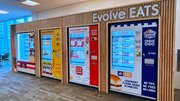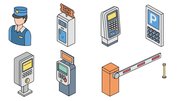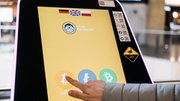Article
Digital advertising growth drives new kiosk application
Self-service deployers can take advantage of out-of-home advertising's growing popularity with an emerging kiosk app.

July 30, 2009
As advertising continues to go digital, some kiosk makers are realizing a unique opportunity to combine a simple self-service concept with digital-out-of-home applications.
"Savvy advertisers now see digital signage and digital out-of-home advertising as part of their marketing mix," said Digital Signage Association executive director David Drain in a contribution to USA Today earlier this year. "With an 11.2-percent growth in 2008, making it a $2.43 billion industry in the U.S., according to PQ Media, digital out-of-home is forecasted to have a 12.9-percent compound annual growth rate through 2012."
In recent years and months, kiosk companies such as Hercules Networks and Nuvo Technologies LLC have watched the DOOH growth. Now the two are offering kiosk deployers a chance to leverage that growth to create an entirely new revenue stream.
Both companies offer cell phone-charging kiosks that feature LCD screens on which ads or brand promotions can be run. The kiosks feature as many as 10 to 24 charging tips, depending on the company and the model, and are compatible with at least 90 percent of mobile devices on the market.
Where and how to deploy the kiosk
Scott Calhoun, managing partner of Nuvo Technologies, says kiosks can be ideal for many different deployment environments. For instance, Nuvo has worked with Six Flags, United Airlines, college campuses and bars around its hometown of Baltimore, Md., in addition to convention centers and hotels. But the company is narrowing its focus.
"In the past, what we've done is placed them in different types of environments to see what we thought would work best," Calhoun said.
Calhoun says airports, hotels and convention centers proved the best environments and, thus, will now be areas of focus for Nuvo.
Hercules Networks also has worked with Six Flags, and recently completed a deployment with AT&T in the Boston Celtics' TDBankNorth Arena.
Paul King, Hercules' CEO, says the kiosks also can make an impact in a retail setting.
"For a retailer, it's a vehicle for them to stand out among the competition — to draw traffic into their store for a different purpose than they normally would," King said.
A charging kiosk deployer has myriad options from which to choose. Deployers can either sell ads themselves to outside entities or to run their own branding messages and promotions on the kiosk displays. King says the choice depends on the specific goals of the business.
"Are they going to make more revenue from outside advertising or from their own advertising?" he said. "It's case-by-case, and it ultimately comes down to a balance between customer service and revenue."
Deployers also have the option of running the ads through a Hercules-operated network or updating the content manually via USB or Flash drive themselves. With Nuvo, deployers are provided access to a Web-based system that provides tools to manage the content independently. Deployers can access online training videos or particpate in a user blog for service and maintenance instructions.
Deployers also can associate fees with cell phone charges, or they simply can offer it as a free service. Ryan Doak, another of Nuvo's managing partners, says more often than not, offering the charge for free is the best option for a deployer.
"Most people will find that when they deploy these, to charge a fee is probably not always the best idea," he said. "You're going to generate more revenue by selling advertising. We've found that a lot of companies will sell advertising, and now instead of making two bucks, they're making 2,000."
Interactive options
Both Hercules and Nuvo have also experimented with interactive applications.
"The bigger request lately has really been for touchscreen applications," Doak said. "They use them at tradeshows, so the charging aspect would pull people into a tradeshow booth and then while they're waiting for it, they can do an interactive application to learn more about somebody's product or service."
The kiosks also can incorporate text-messaging or Bluetooth capabilities. King and Hercules are working with one retail department store on an application that will detect Bluetooth-enabled devices in range and push out promotional offers from retailer to the devices' owners.
Nuvo's application also allows for text-message interactivity, and Doak says it can open up new avenues for deployers to engage with their customers.
"We can go back to the customer and say, 'Hey, you've had 500 people text in this month,' and not only do they know they have interest, but they have all the cell phone numbers of these people who they know are interested in their product or establishment, and they can directly communicate with them at that point."
 ChatGPT
ChatGPT Grok
Grok Perplexity
Perplexity Claude
Claude









